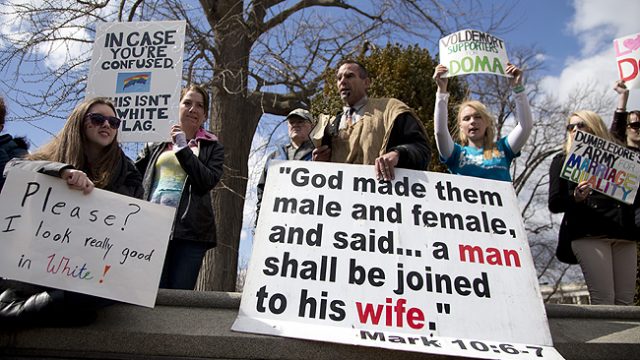Emboldened by court rulings, Winston-Salem gay couple seeks marital recognition from Methodist Church

IN THE MIX: Allan Hoyle of North Carolina, with the large white sign, speaks out against gay marriage in 2013.
By Paul Chesser | Special to Watchdog.org
Only a month after two federal judges issued decisions that nullified North Carolina’s constitutional ban on government recognition of same-sex marriage, a gay couple has challenged the United Methodist Church because a Winston-Salem minister has refused to preside over their nuptials.
Since the legal door was opened to same-sex marriage, couples have sought licenses and ceremonies from government officials in counties throughout the Tar Heel State. But the Winston-Salem case is the first known incident in the state in which a gay couple has sought to force their newly granted rights upon private parties or institutions who don’t want any part of it.
The development represents an “I told you so” for traditional-marriage and free-market advocates who warned that it was a logical outcome of legalized gay marriage.
“We must see in this situation that homosexual activists will never be satisfied with same-sex marriage only,” said the Rev. Mark Creech, executive director of the Christian Action League of North Carolina. “Their objective is to silence all opposition to their sexual sin either by delusion or legal means.”
“The small minority that has fought to redefine the institution of marriage to somehow include same-sex unions promised during the debate on North Carolina’s Marriage Amendment that they didn’t want to force churches to perform same-sex marriages,” said Tami Fitzgerald, executive director of the NC Values Coalition. “They said they only wanted the ‘freedom to marry.’ This complaint against the Methodist bishop proves that was a lie.”
But the Winston-Salem case is not a straightforward challenge against a church or minister who objects to performing ceremonies based upon biblical principles. The same-sex partners, Kenny Barner and Scott Chappell, are members of Green Street United Methodist Church. In March 2013, Green Street pastor the Rev. Kelly Carpenter and his congregation announced they would refuse to conduct wedding ceremonies for anybody until the United Methodist denomination lifted its ban on homosexual marriage.
“On the matter of gay marriage, the church sees injustice in the legal position of state government and the theological position of our denomination,” said a statement released by Green Street UMC at the time. “The leadership council has asked that their ministers join others who refuse to sign any state marriage licenses until this right is granted to same-sex couples.”
Fast-forward to this week, and Barner and Chappell have filed a complaint with the Western North Carolina Conference of the United Methodist Church against the minister – Carpenter – who supports their newfound right to be married. According to Fox affiliate WGHP in High Point, Carpenter has said he believes gays should be married but that he cannot participate without risking discipline from the denomination.
Pressed far enough, the couple’s case could find its way to an internal United Methodist Church legal proceeding in which Rev. Carpenter could be defrocked.
The complaint by the same-sex couple asserts that the Methodist Church requires spiritual leaders to “be in ministry with all people,” even though the church also holds that homosexuality is “incompatible with Christian teaching.” Barner and Chappell also accuse the church of “gender discrimination.”
Gay-marriage critics say the complaint is really intended to coerce change at the denominational level rather than force one of its ministers to get in line.
“The complaint is a publicity stunt by a small liberal church long on record in opposition to United Methodism’s official prohibition against same-sex rites,” said Mark Tooley, president of the Institute on Religion and Democracy, who is also a Methodist.
Already there have been precedents set for private businesses in other states where same-sex marital unions are recognized. In Colorado a baker was told he must produce wedding cakes for gay couples despite his religious beliefs, and a New Mexico photography business was told to pay attorneys’ fees for a homosexual couple because the owners declined to work their “wedding.” And in Idaho, two ministers were told they must conduct same-sex weddings or be fined and face jail time.
The court rulings in North Carolina, by Asheville Judge Max Cogburn and Greensboro Judge William Osteen, came only four days apart in mid-October. They followed a Court of Appeals decision to strike down a similar ban in Virginia. Cogburn and Osteen cited the higher court’s ruling as precedent to justify their decision on North Carolina, which is in the same federal circuit as Virginia.
In North Carolina, several county magistrates have resigned rather than be forced to preside over marriage ceremonies for couples of the same gender.
“It’s naïve to think this matter was ever about ‘live and let live,’ Creech said. “Homosexual activism is an aggressive, insistent force, just as surely as it was when it pressed upon Lot’s door in Genesis chapter 19.
“Churches should take action to protect themselves in their bylaws and books of discipline, stating clearly and consistently their religious objections, otherwise they can be vulnerable to attacks from within and without.”







